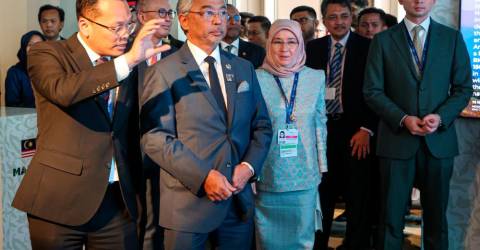DUBAI: Malaysia hope to see countries coming together with ambitious and concrete commitments to address climate change during the 28th Conference of Parties (COP28) to the United Nations Framework Convention on Climate Change (UNFCCC), here.
Minister of Natural Resources, Environment and Climate Change Nik Nazmi Nik Ahmad said through innovative solutions, sustainable practices, and collaborative initiatives, our nation will proudly showcase its role as a regional leader in addressing climate challenges at the Malaysia Pavilion.
“There must be a sense of urgency and a willingness to work together.
“As we navigate the complexities of climate negotiations, let us be mindful that our decisions today shape the world that our future generations will inherit,“ he said during the launching ceremony of Malaysia Pavilion for COP28 in Dubai Expo city, here.
Earlier, Yang di-Pertuan Agong Al-Sultan Abdullah Ri’ayatuddin Al-Mustafa Billah Shah officially launched the Malaysia Pavilion at COP28, here that will function from Nov 30 until Dec 12.
Also present at the ceremony were Raja Permaisuri Agong Tunku Azizah Aminah Maimunah Iskandariah and the Regent of Pahang, Tengku Hassanal Ibrahim Alam Shah Al-Sultan Abdullah Ri’ayatuddin Al-Mustafa Billah Shah.
According to Nik Nazmi, Malaysia has addressed the crucial role of finance in climate change by urging the developed nations to contribute US$100 billion (US$1=RM4.67) annually, which was highlighted in Prime Minister Datuk Seri Anwar Ibrahim’s address at the UN General Assembly in September.
“Separately, developing a long-term mitigation strategy will be key to guiding sectoral and cross-sectoral policy planning in line with the Paris Agreement goals.
“Malaysia is hence formulating a Long-Term Low Emissions Strategy (LT-LEDS) and Nationally Determined Contribution (NDC) Roadmap, which will serve as a comprehensive guideline towards our achieving net-zero emissions as early as 2050.
Thus, he said among Malaysia’s priorities is the drafting of a climate change bill, the establishment of a national adaptation fund, and the development of a carbon market mechanism. – Bernama



